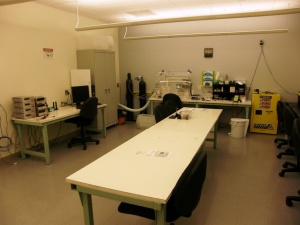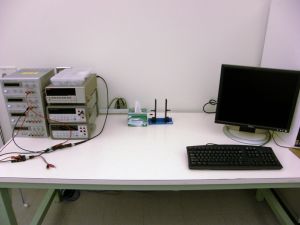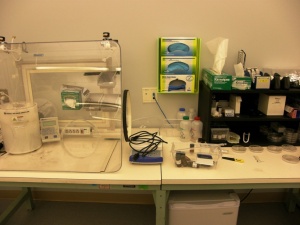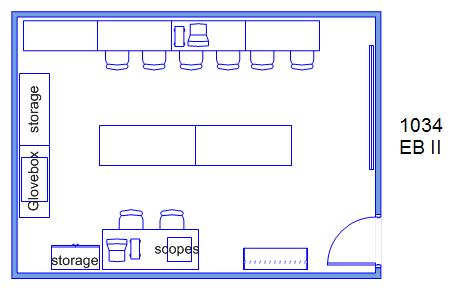Difference between revisions of "Teaching Labs/1034 EB2"
| (57 intermediate revisions by 6 users not shown) | |||
| Line 1: | Line 1: | ||
| − | + | {{Teaching Labs}}__NOTOC__ | |
| + | =Soft Electronics Lab= | ||
| − | + | The '''Soft Electronics Lab''' contains a wide variety of equipment and materials, providing students an environment that is unique amongst the ECE department's teaching labs. A ductless fumehood and nitrogen glovebox provide students with a safe and clean environment for lab activities, and additional equipment and materials - including spectrometers and photodetectors - allow students to understand and work with the properties and fabrication of organic electronic and liquid-crystal devices. | |
| − | + | Classes in this lab focus on the field of "soft" electronics, organic or condensed-matter materials that have grown to become a core technology of an increasing number of modern consumer products. The development of these courses and their [http://www.ece.ncsu.edu/oleg/wiki/NSF_Lab_Modules course materials, procedures, and required lab equipment] has been supported by a sponsored research grant funded by the National Science Foundation (NSF) under the Course, Curriculum, and Laboratory Improvement (CCLI) program. | |
| − | |||
| − | + | ---- | |
| + | ====Lab Schedule==== | ||
| + | The schedule is subject to change at anytime, so check back often. To schedule this lab, email [mailto:ecehelp@ncsu.edu?Subject=EB21034-Lab-Reservation ecehelp@ncsu.edu]. | ||
| − | {| | + | {{#tag:iframe|key="local"|path="calendar/u/0/embed?src=ncsu.edu_chn1tb1tc2meambkfspdkjatts@group.calendar.google.com&ctz=America/New_York"}} |
| − | | | + | |
| − | | | + | |
| + | ---- | ||
| + | |||
| + | ====Course Information==== | ||
| + | |||
| + | * [http://courses.ncsu.edu/ece592s/common/ ECE 492-003] | ||
| + | * [http://courses.ncsu.edu/ece592s/common/ ECE 592-003] | ||
| + | * ECE 739 | ||
| + | |||
| + | The '''Soft Electronics Lab''' is principally used for the Organic Electronics and Liquid Crystal Displays course, which is provided at both the undergraduate and graduate level. This course introduces students to concepts and common organic devices found within soft electronics, and addresses their differences in fabrication and physical properties versus more traditional solid-state devices. Topics include electronic transport and light emission, self-assembly and partial-order, lightwave propagation, and fabrication. | ||
| + | |||
| + | Additionally, lab activities are designed to give students hands-on experience with organic electronic materials and liquid crystal display technology, and primarily focus on the fabrication and characterization of four devices: | ||
| + | :*a single-pixel liquid crystal display (LCD), | ||
| + | :*an organic light-emitting diode (OLED), | ||
| + | :*an organic photovoltaic (OPV) solar cell, | ||
| + | :*and a polymer field-effect transistor (pFET, or organic thin-film transistor, OTFT) | ||
| + | ---- | ||
| + | |||
| + | |||
| + | ==Equipment== | ||
| + | {| cellpadding="5" | ||
| + | | '''Number of Computers''': | ||
| + | :* 2 | ||
| + | | | ||
| + | | '''Operating System''': | ||
| + | :* Microsoft Windows 7 Enterprise | ||
|- | |- | ||
| − | | Processor | + | | '''Model''': |
| − | + | :* Dell Optiplex 990 | |
| + | | | ||
| + | | '''Processor''': | ||
| + | :* Pentium Core i7 3.1 GHz | ||
| + | | | ||
| + | | '''RAM''': | ||
| + | :* 4096 | ||
| + | |} | ||
| + | {| cellpadding="5" | ||
| + | | '''Software''': | ||
| + | :* Adobe Acrobat Professional | ||
| + | :* Lambda Research TracePro | ||
| + | :* Matlab | ||
| + | :* Microsoft Office | ||
| + | :* OpenAFS/Kerberos | ||
| + | :* Starnet X-win32 | ||
| + | :* Sun Java JRE | ||
| + | :* WinSCP SFTP client | ||
|- | |- | ||
| − | | | + | | '''Instruments''': |
| − | + | :* 1 Keithley 6485 5-1/2 digit Picoammeter | |
| − | + | :* 2 Agilent 34401A Digital Multimeters | |
| − | + | :* 2 Agilent E3630A Triple Output Power Supplies | |
| − | | | + | :* 2 Agilent 3612A DC Power Supplies |
| − | + | |} | |
| − | + | ||
| − | | | + | ==Pictures== |
| − | |- | + | {| |
| − | | | + | | [[Image:1034-01.JPG|thumb|Room view]] |
| − | | | + | | [[Image:1034-02.JPG|thumb|Workstation view]] |
| − | + | | [[Image:1034-03.JPG|thumb|Glovebox work area]] | |
| − | |||
| − | |||
| − | |||
| − | |||
| − | |||
| − | |||
| − | |||
| − | |||
| − | |||
| − | |||
| − | |||
| − | |||
| − | |||
| − | |||
| − | |||
| − | |||
| − | |||
| − | |||
| − | |||
| − | |- | ||
| − | | | ||
| − | | | ||
| − | |||
| − | |||
| − | |||
|} | |} | ||
| + | |||
| + | ==Room Layout== | ||
| + | |||
| + | [[Image: 1034EB2.jpg]] | ||
Latest revision as of 11:03, 8 August 2022
Soft Electronics Lab
The Soft Electronics Lab contains a wide variety of equipment and materials, providing students an environment that is unique amongst the ECE department's teaching labs. A ductless fumehood and nitrogen glovebox provide students with a safe and clean environment for lab activities, and additional equipment and materials - including spectrometers and photodetectors - allow students to understand and work with the properties and fabrication of organic electronic and liquid-crystal devices.
Classes in this lab focus on the field of "soft" electronics, organic or condensed-matter materials that have grown to become a core technology of an increasing number of modern consumer products. The development of these courses and their course materials, procedures, and required lab equipment has been supported by a sponsored research grant funded by the National Science Foundation (NSF) under the Course, Curriculum, and Laboratory Improvement (CCLI) program.
Lab Schedule
The schedule is subject to change at anytime, so check back often. To schedule this lab, email ecehelp@ncsu.edu.
Course Information
- ECE 492-003
- ECE 592-003
- ECE 739
The Soft Electronics Lab is principally used for the Organic Electronics and Liquid Crystal Displays course, which is provided at both the undergraduate and graduate level. This course introduces students to concepts and common organic devices found within soft electronics, and addresses their differences in fabrication and physical properties versus more traditional solid-state devices. Topics include electronic transport and light emission, self-assembly and partial-order, lightwave propagation, and fabrication.
Additionally, lab activities are designed to give students hands-on experience with organic electronic materials and liquid crystal display technology, and primarily focus on the fabrication and characterization of four devices:
- a single-pixel liquid crystal display (LCD),
- an organic light-emitting diode (OLED),
- an organic photovoltaic (OPV) solar cell,
- and a polymer field-effect transistor (pFET, or organic thin-film transistor, OTFT)
Equipment
Number of Computers:
|
Operating System:
| |||
Model:
|
Processor:
|
RAM:
|
Software:
|
Instruments:
|



